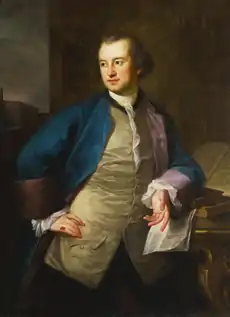John Morgan (physician)
John Morgan (June 10, 1735 – October 15, 1789), "founder of Public Medical Instruction in America," was co-founder of the Medical College at the University of Pennsylvania, the first medical school in Colonial America. He served as the second chief physician and director general of the Continental Army, an early name for the Surgeon General of the United States Army. He was an early member of the American Philosophical Society, elected in 1766, where he served as curator from 1769 to 1770.[2]
John Morgan | |
|---|---|
 A portrait of Morgan, c. 1764 | |
| Born | June 10, 1735 |
| Died | October 15, 1789 (aged 54) |
| Alma mater | University of Edinburgh University of Pennsylvania |
| Known for | founder of what is now the Perelman School of Medicine at the University of Pennsylvania |
| Spouse | Mary Hopkinson[1]: 39 |
| Scientific career | |
| Doctoral advisor | William Cullen |
Early life and education
The first son of Evan Morgan, an immigrant from Wales, and Joanna Biles, Morgan was born in Philadelphia in the Province of Pennsylvania in pre-Revolution British America. After a classical education at West Nottingham Academy in Colora, Maryland,[3] he graduated from the College of Philadelphia, now the University of Pennsylvania, in 1757.[1]: 18 [4]
He fought for the British during the Seven Years' War, and was commissioned as a lieutenant where he served as a surgeon on the western frontier. After that, he studied medicine at the University of Edinburgh in Edinburgh, Scotland, where he graduated in 1763. He subsequently explored Europe, studying medical practice in Paris and visiting Italy. During this time, he was elected to the Royal Academy of Surgery at Paris in 1764 and the Royal College of Physicians of Edinburgh and of London in 1765.[4]
Career
College of Philadelphia Medical School

In 1765, along with William Shippen, another Edinburgh graduate, Morgan co-founded the College of Philadelphia Medical School, the first medical school in North America.
American Revolutionary War
Morgan served as chief physician to the Continental Army from October 1775 to January 1777 during the American Revolutionary War and was empowered by the Continental Congress to inspect regimental hospitals and transfer patients if warranted and to examine regimental surgeons. Rancor with the regimental surgeons became so extensive that Morgan quit following the Continental Army's move from Boston to New York City.
Morgan was a founding member of the American Philosophical Society in 1766, based in Philadelphia.
Death
Morgan died in Philadelphia on October 15, 1789, at age 54.
Notes
- Morgan, John; Harding, Julia Morgan (1907). The journal of Dr. John Morgan of Philadelphia. Philadelphia: J. B. Lippincott Company. OCLC 4074944.
- Bell, Whitfield J., and Charles Greifenstein, Jr. Patriot-Improvers: Biographical Sketches of Members of the American Philosophical Society. 3 vols. Philadelphia: American Philosophical Society, 1997, I:14, 260-62, 278, 327-36, 328, 345-46, 353, 376-77, 403, 415, 427, 447, 450, 504, 513, II:17, 25, 37, 55, 128, 136, 138, 162, 165, 193, 272, 409, 420, III:8, 139, 160, 195, 282, 522—23.
- Kelly, Howard A.; Burrage, Walter L. (eds.). . . Baltimore: The Norman, Remington Company.
- "John Morgan (1735–1789)", Archives, University of Pennsylvania, accessed 29 January 2011
References
- "John Morgan (1735–1789) founder of American medical education.", JAMA (published November 15, 1965), vol. 194, no. 7, pp. 825–6, 1965, doi:10.1001/jama.194.7.825, PMID 5321359